The story of
Andras Majtenyi
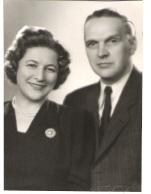
Jeno and Nelly Markovits, ca. 1946
Parents
-
Father:
Jacob Marcovics, born 1899 in Nagyvarad, Hungary, bank clerk, Jewish
-
Mother:
Petronella (Nelly) Braun, born 1902, Jewish
Curriculum Vita Jenoe Markovits, Version 1
Jacob Marcovics became Eugene (Jen\"o) Markovits
and joined the Hungarian Communist Party in 1919 and
stayed a member, even after it became illegal.
After the Trianon Treaty, Nagyvarad became again Oradea (Rumania)
and in 1940 it returned to Hungary. At this time
Markovits was a member of the illegal anti--fascist cell,
working under the command of J. Kadar and G. Peter.
He was arrested in 1943 and set free in July 1944.
After Szalasi's coup he went into hiding with his son
in a mental hospital, where his wife worked as a nurse.
From 1945--1948, J. Kadar was head of the Communist Party
of greater Budapest, Z. Vas was Budapest's maire,
and Markovits belonged to their closest circle.
Curriculum Vita Jenoe Markovits, Version 2
Jen"o Markovits, born Jacob Marcovics, born 1899 in Nagyvarad, Hungary, bank clerk, jewish.
Jacob Marcovics became Eugene (Jen"o) Markovits and joined the
Hungarian Communist Party in 1918 and stayed a member,
even after it became illegal. After the Trianon Treaty,
Nagyvarad became again Oradea (Rumania).
He joined the Rumanian communist Party in 1930.
When Oradea returned to Hungary in 1940,
Markovits joined the illegal Hungarian Communist Party and
was a member of the illegal antifascist cell,
working under the command of J. Kadar and G. Peter.
He was arrested in 1943 and set free in July 1944.
After Szalasi's coup he went into hiding with his son in a mental hospital,
where his wife worked as a nurse.
From 1945-1948, J. Kadar was head of the Communist Party of greater
Budapest, Z. Vas was Budapest's maire, and Markovits belonged
to their closest circle.
Already in April 1945 he was member of the antifascist committee
of economic reconstruction (Committee of Seven),
and soon after became Vice-director of the Monetary Institute.
In 1946 its Socialdemocrat director L. Farago was ousted (but not arrested)
and Markovits became its director and responsible for the nationalization
of the big industries.
In 1948 Markovits became director-general of MONIMPEX,
the giant state controlled import/export company,
which held in fact the monopoly over all import and export of
food products and consumer goods.
In 1953 he was ousted, and demoted to head its division of
textile and fashion industries.
He retired from this position in 1967,
but remained active as consultant to the Hungarian
economic reforms and died in 1971.
Andras Majtenyi
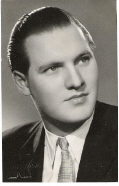
Andras Majtenyi (Markovits), ca. 1946
Curriculum vitae Andras Majtenyi
-
February 2, 1924: Born in Oradea (Rumania).
This was written by Andras Majtenyi in February 1957, for the French Police.
I was born on February 2, 1924, in Nagyv\`arad (Transylvania), Rumanian province
till 1940, then Hungarian till 1944, then again Rumanian.
My father was a bank clerk, and later founded his own business in textile
en gros.
I did my first studies in Nagyv\`arad in a Rumanian school, but in 1938 my
father enrolled me, aged 14, in the Lyc\'ee Louis--le--Grand [in Paris].
The outbreak of the war interrupted my stay in France, and I continued my
studies in Rumanian Transylvania, which later became Hungarian.
I was expelled from the school in 1942,
two weeks before the matriculation exam, due to
the anti--nazi propaganda, in which I was involved with
four of my class mates, within a literary circle. One year later,
the ministery of National Education gave us nevertheless the permit
to present ourselves to the examination.
Nevertheless, the university remained closed for me. I decided therefore,
to become a press photographer and I worked as such for more than two years
for several papers, local
and national (Friss Ujsag, Estilap and Nagyv\`arad).
From 1941 on, my father and I were part of an anti--fascist resistance
network which was involved in distributing propoganda material
and was running an underground newspaper. In 1943 my father was arrested,
and in 1944 it was my turn. Nevertheless, the change of governement
(the governement Sztojai was replaced by a more liberal governement,
which prepared peace with the Allied Forces) led to the liberation
of many prisonners.
Our network remained activ till the liberation of our country
[Hungary] and we were in direct contact with J. Kadar and G. Peter,
members of the clandestine Central Committee of the Hungarian
Communist Party.
At the liberation the few members of the Hungarian Resistance
were lead to form the new cadres of the new administration.
I followed my superiors of the resistance to the political police
of the governement of Miklos Bela. I was appointed lieutenant.
I also enrolled simultaneously at the school of Foreign Affaires,
and from 1946 on, I worked at the ministery of External Commerce.
My father became in this period vice--president, and later
General Director, of the Central Bank, and in 1948 General Director
of the State Monopolies. After my arrest in 1953 he was deposed
and nominated Director of the Textile (en gros) Enterprises.
At the Ministery of External Commerce, I was occupied with the relations
between Hungary and France and Rumania. In 1946 and 1947 I was sent
to Bucarest for the preparation of the commercial treaties and
to protect the Hungarian interests in the Hungarian owned companies
in Rumania.
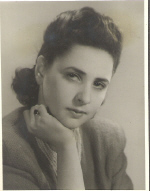
Marika Deutsch, ca. 1946
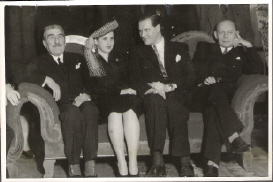
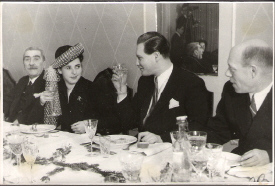
Wedding foto:
Benes (President of HUNGARIA), Marika and Andras, Csont (of the communist
party, later executed in the trials)
In 1946, a married Marianne Deutsch, daughter of an industrialist
in chemical products, but in 1949 we got divorced, and my wife
and my son established themeselves in Zurich (Mythenquai 22).
I worked till 1952 in exterior commerce, where I was mainly involved
with the exportation of textile materials (mostly draperies and filts).
In this capacity, I had contacts with foreign traders and journalists,
like, for example, the head of the A.F.P. Ren\'e Blanchier.
I became therefore supsect to the political police, especially
after 1952. When the crisis struck foreign trade, the governement
repostioned its cadres and I became administrator in an explosive
factory.
In 1953, the political police arrested me under the accusation
of espionnage and I was sentenced to 12 years of prison. Due to
the political detente, I was in jail for only 2 1/2 years,
till August 30, 1955, where I was provisorically set free.
After my liberation I could only find employment in a subaltern
position at the commercial section of the Minerlas Trust.
On November 29, 1956, I passed the Austrian frontier clandestinely
and asked for asylum. Then I contacted the French Embassy in Vienna,
which gave me the permission to leave for France.
I would like to precise that, besides Hungarian and French,
I also speak fluently the languages German and Rumanian.
Signed: February 1957, Andre Majtenyi, 153 rue Gabriel P\'eri,
Bic\^etre, Tel: ITA(lie) 1588
The family saga reports:
-
1945:
In 1945 at then famous cabaret singer and dancer, Anna Kellyi,
was arrested and charged of collaboration with the Nazies.
In the same year, Andras arranged for her liberation and
took her as a lover for while, a story, which captured the
imagination of Budapest at the time.
The family saga reports:
-
1946:
In 1946 (?) there was a shooting incident, involving the head
of British Security at the Allied Control Council and
Andras. It errupted in a night club in a quarel about a woman,
and nobody was hurt. But it lead to considerable diplomatic
commotions.
In 1987 I met some I. Egri, who told the following:
-
He had known Andras Majtenyi back in 1945-46. Andras was boasting
about his possession of weapons. He was also claiming that he
was part of a secret commando of four preparing the abduction
from Germany of Szalasi, with the purpose to bring him before a
people's tribunal. In the end the abduction did not take place,
as the Americans extradited Szalasi to Hungary, where he was
sentenced to death by a People's Tribunal and executed.
-
December 1946, Marika Deutsch and Andras Majtenyi get married.
Jen\"o Markovits told me in 1969:
-
In 1947 he was appointed head of the Central Bank. He planned to
sell some of Hungary's gold reserves on the world market for
the financing of necessary investments in Hungary's infrastructure.
The governement opposed this plan, and he was then transferred the
head the Hungarian Mortgage Bank and was member of the
planning committee preparing the nationalizations.
In 1947,
Andras takes part in the mobilization of
the workers of HUNGARIA leading to demonstrations and strikes
calling for nationalization.
-
January 24, 1948 Signing of the Hungarian--Rumanian treaty of friendship,
cooperation and mutual help. Photograph of Andras Majtenyi at the
ceremony, Marika takes part in the following receptions. \\
-
March 12, Janos Majtemyi born.
-
August 1947, Kadar becomes Interior Minister.
-
November 1947, Andras and Marika Majtenyi divorce.
-
February 1949, Andras denounces Marika for trying to emigrate illegally.
G. Peter deals with the case personally, confronts Andras and Marika,
and realises that it is a family conflict. "Children, sort it out
between yourself!".
-
April 1949, Rozsi Deutsch emigrates to Switzerland.
-
June 2, 1949:
Janos and Marika emigrate to Switzerland.
Passionate correspondence
(hundreds of letters)
between Marika and Andras, lasting till April 1951.
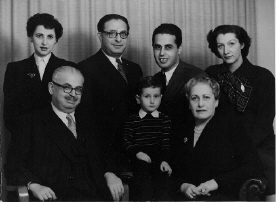
Family picture by Bettina, Zurich 1952:
Above: Marika Makowsky-Deutsch, Gabriel Makowsky, Denes Deutsch, Hanny Deutsch
Below: Sandor Deutsch, Janos Majteny (Makowsky), Rozsi Deutsch
-
July 1949, Andras helps Sandor Pick, Marika's uncle, to emigrate illegally
to Austria.
-
Jen\"o Markovits becomes director general of MONIMPEX.
Andras works for Hungarian Soviet Trade (KABEL and XXX).
-
1950:
Andras works for Hungarian Foreign Trading N.E.
-
Jen\"o Markovits as head of a trade delegation in Switzerland.
Receives permission to visit Janos and Marika.
-
1951:
Spring, Kadar arrested.
-
July, 1952: Andras marries a gymnastic teacher (name not in family documents).
-
December, 1952:
G. Peter arrested. Peter was Jewish, and since 1946 head of the
political police AVO. Rakosi initiates purges, following Stalin's
doctor's trial.
-
February 1953, Andras arrested and detained in Vaci prison.
-
March 1953, Jen\"o Markovits transferred from MONIMPEX to
Textile en gros.
-
May 1953, elections to the general assembly.
-
June 27--28, 1953: Meeting of the Central Committee. Exposure of mistakes in the
past and their reasons (Stalinism). Decision on the new General Line of the
Party.
-
July 1953, Meeting of the newly elected general assembly.
-
February 1954: Andras sentenced to 12 years of prison.
-
May 24--30, 1954: Third Party Congress.
-
October 23--24, 1954: Foundation of the Patriotic Popular Front.
-
November 28, 1954: Elections to the Soviets.
-
April 14, 1955: Meeting of the Central Committee, Imre Nagy expelled from
Politbureau and Central Committee and all his party functions.
-
May 1955, Warsaw Pact formally formed.
The Hardliners retake control.
-
August 1955, Andras set free again.
Rumor has it, that he remarried his former wife, the gymnastic teacher
(unconfirmed).
-
July 18--21, 1956: Meeting of the Central Committee. M. Rakosi deposed as
First Secretary and expelled from Politbureau.
-
October 23--November 4, 1956: Governement Imre Nagy, Soviet Intervention.
-
November 1956, Andras passes illegally the Austro--Hungarian border.
Rumors have it that he was sent abroad as an agent.
-
1957:
I meet my father, after my stepfather told me, that he was not my father.
-
February, 1958: My stepfather, G. Makowsky commits suicide.
-
1959:
Andras marries Nicole.
-
1964: Nelly Markovits dies of liver cancer in Paris.
-
1965:
Jen\"o Markovits publishes his book on fashion in Budapest.
The book is followed by a public discussion reflected in the
newspapers and leads to a reform of the Hungarian Fashion Industry.
-
1966:
Andras divorces Nicole.
-
1967:
Andras marries Lily, his last wife.
-
1968:
Andras becomes French Citizen. At this occasion
the following annexe to his CV was submitted:
I have mentionned in my demande of naturalization that the Special
Counsil of the Tribunal in Budapest had sentenced me on February 12,
1954 to 12 years of prison, and I would like to add some remarks to this:
I was arrested by the agents of security on February 11, 1953,
and after a year of secret preventive detention I was accused of crimes
against state security and of spying for the benefit of Western Powers
and helping people secretely fleeing the country.
In an appeal, this sentence was reduced to four years,
but due to the political changes after Stalin's death, the
political trials were revised, and I was liberated on August 31, 1955,
after 2 1/2 years of detention.
It is clear, that all this was a political trial, typical for
totalitarian regimes.
My father told me:
-
1971:
September, Andras, who was refused a visa to Hungary, since he
had left illegally (?), receives finally, under direct intervention
of J. Kadar, permission to visit his dying father.
-
September 21,
Jen\"o Markovics dies in Budapest. The Party (or Andras ?)
pays for a burial place for 50 years.
In the newspaper Magyar Hirlap a short obituary appears,
stressing that he was director general of MONIMPEX and ...
-
September 22, Andras is called for special interrogation to the
head quarters of the political police.
-
April 1977, Andras Majtenyi dies of heart failure. His body is given to
the anatomic institute for scientific purposes. His widow,
Lily Dukerque has mass read for him.






